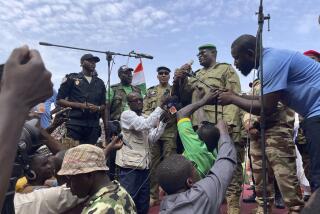Morocco Says Spain Is Making Big Deal Out of Tiny Land Grab
- Share via
CAIRO — It may end up as a mere footnote in the annals of military history, but Morocco’s decision to send 11 armed men, a few tents and a flag out to a speck of land just off its coast is being called the first invasion of West European territory since World War II.
Spain is so angry, in fact, that it has sent gunboats to the region.
The tiny island in dispute is really just a big rock with some lizards, bugs and wild parsley. Spain says it owns the rock, which it calls Isla del Perejil, or Parsley Island. Morocco says no, it owns the rock, which it calls Leila.
Until recently, no one really cared much who owned the rock, because no one lives there. Then, on Thursday, a small band of Moroccan civil guard police ferried its way out to the islet, set up camp and raised the Moroccan flag.
Morocco says it has set up an observation post to help ward off illegal immigrants and aid in the war on terrorism. But Spain--and apparently, much of Europe--believes it has invaded sovereign territory.
“In a secret operation carried out by sea, Moroccan soldiers took the Spanish-owned Isla del Perejil late on Thursday, hoisted their country’s red and green flag from its highest point, set up camp and waited for the Spaniards to try to take the land back,” said an article in London’s Guardian newspaper.
Suddenly, there is a new clash between the West and the Arab world.
The Arab League has lined up behind Morocco. “The position of the League is to support Morocco in its dispute with Spain over this island,” the group’s secretary-general, Amr Moussa, said in a statement.
The European Union is backing Spain. “This clearly is a regrettable incident,” European Commission spokesman Gunnar Wiegand said at a news briefing last week. “It constitutes a violation of Spanish territory.”
Spain and Morocco have had strained relations since Spain’s days as a colonial power, when it controlled the North African country’s northern coast. Spain continues to possess two small enclaves along that coast, Ceuta and Melilla, as well as a scattering of offshore islets--all of which Morocco claims as its own. Isla del Perejil--or Leila--is about four miles from Ceuta.
But the animosity has taken on even broader significance in the wake of the Sept. 11 terrorist attacks, as moderate leaders in the West and the Arab world have tried to neutralize extremists who have declared that there is a clash of civilizations, a fundamental battle between the Islamic world and the Judeo-Christian West.
Historically, Morocco has had close ties with the U.S. and has helped in the fight against terrorism. But the tense atmosphere--and the memory of Argentina’s decision to seize the Falkland Islands in 1982, sparking war with Britain--has raised concerns that this could become a crisis.
By Sunday, both sides were calling for calm, although neither was willing to give in.
“We believe there is an exaggeration on the Spanish side,” Moroccan Foreign Minister Mohammed Benaissa said in a telephone interview. “The whole island is only as big as a football stadium. It has never been inhabited. We are not the ones making a big issue.”
In an interview with the daily newspaper El Mundo, Spanish Foreign Minister Ana Palacio said Spain did what it had to do when it dispatched four gunships to the vicinity of Ceuta and Melilla.
“Now we’ll see what happens,” Palacio was quoted as saying. “There is a language here of symbols that we all understand,” she said, adding that the incident could be “resolved reasonably.”
Palacio also reminded the Moroccan government that 250,000 of its citizens live in Spain and that the two countries have maintained a friendship and cooperation treaty since 1991.
In both countries, public opinion appears to be in support of holding firm.
In Spain, El Mundo said: “The king of Morocco has chosen the path of confrontation with one of the great European democracies, and this should have a serious cost for him.”
In Morocco, the press is squarely behind the decision to retake what is widely viewed there as Moroccan territory.
“The island is [220 yards] off the coast of Morocco’s mainland,” said Dris Issawi, managing editor of Al Sabah newspaper in Rabat, the capital. “The whole thing is about [30 acres] big. Moroccans used to go there with their sheep because there was good food on the island for sheep.”
The incursion--to use the Europeans’ term--came as Morocco began several days of celebrations for King Mohammed VI’s wedding. Absent from the festivities were Spanish officials, who, given the strains between the two nations, had decided even before the invasion not to attend the celebrations.
Jailan Zayan of The Times’ Cairo Bureau contributed to this report.
More to Read
Sign up for Essential California
The most important California stories and recommendations in your inbox every morning.
You may occasionally receive promotional content from the Los Angeles Times.













